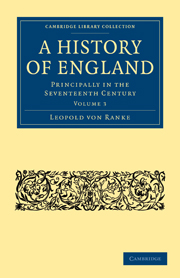Book contents
- Frontmatter
- Contents
- BOOK XI THE COMMONWEALTH IN ENGLAND, 1649—1653
- BOOK XII THE PROTECTORATE OF OLIVER CROMWELL, 1653–1658
- BOOK XIII FALL OF THE PROTECTORATE AND THE COMMONWEALTH. RESTORATION OF THE MONARCHY, 1658—1660
- BOOK XIV THE FIRST FIVE YEARS UNDER CHARLES II. THE RESTORATION OF THE ANGLICAN CHURCH
- CHAP. I The state of affairs at the Restoration
- CHAP. II The Convention Parliament in the summer of 1660
- CHAP. III Foreign policy. Marriages in the Royal Family
- CHAP. IV Religious differences. The Coronation. A new Parliament
- CHAP. V The first two years of the Long Parliament of the Restoration. The Act of Uniformity
- CHAP. VI Relations with France. Sale of Dunkirk
- CHAP. VII A scheme for reunion with Rome. Claim to the dispensing power. Personal relations in Court and State
- BOOK XV THE DUTCH WARS OF CHARLES II. ESTABLISHMENT OF THE PROTESTANT AND PARLIAMENTARY CHARACTER OF THE CONSTITUTION 1664—1674
CHAP. III - Foreign policy. Marriages in the Royal Family
Published online by Cambridge University Press: 07 June 2011
- Frontmatter
- Contents
- BOOK XI THE COMMONWEALTH IN ENGLAND, 1649—1653
- BOOK XII THE PROTECTORATE OF OLIVER CROMWELL, 1653–1658
- BOOK XIII FALL OF THE PROTECTORATE AND THE COMMONWEALTH. RESTORATION OF THE MONARCHY, 1658—1660
- BOOK XIV THE FIRST FIVE YEARS UNDER CHARLES II. THE RESTORATION OF THE ANGLICAN CHURCH
- CHAP. I The state of affairs at the Restoration
- CHAP. II The Convention Parliament in the summer of 1660
- CHAP. III Foreign policy. Marriages in the Royal Family
- CHAP. IV Religious differences. The Coronation. A new Parliament
- CHAP. V The first two years of the Long Parliament of the Restoration. The Act of Uniformity
- CHAP. VI Relations with France. Sale of Dunkirk
- CHAP. VII A scheme for reunion with Rome. Claim to the dispensing power. Personal relations in Court and State
- BOOK XV THE DUTCH WARS OF CHARLES II. ESTABLISHMENT OF THE PROTESTANT AND PARLIAMENTARY CHARACTER OF THE CONSTITUTION 1664—1674
Summary
Were it allowable to use such a phrase as a negative event, I should say that among the most important of such events was the fact that the restoration of the monarchy in England was accomplished without the direct interposition of any of the great continental powers. The political independence of the realm of which the Tudors had laid the foundations, which under the Stuarts had been extended so as to include the whole of Great Britain, and which had recently under Cromwell displayed its full strength to the world, was now confirmed by the manner in which the return of the exiled royal line had been effected.
But the evil which had been avoided during the crisis itself, became again imminent as soon as that crisis was past. King Charles II, long accustomed to look abroad for support, felt himself compelled, by the insecurity of his authority even after his restoration, to seek the assistance of foreign powers in his domestic policy.
He applied first of all to Holland and Spain. In July 1660 the States-General suggested to Charles II the possibility of renewing their old alliance with England. Ormond and Hyde replied, that the promise of protection against external foes, which would have formed the main point in the terms of agreement, was of no value to the King of England; cut off as he was from the rest of the world he needed protection only against his foes at home.
- Type
- Chapter
- Information
- A History of EnglandPrincipally in the Seventeenth Century, pp. 335 - 347Publisher: Cambridge University PressPrint publication year: 2010First published in: 1875

